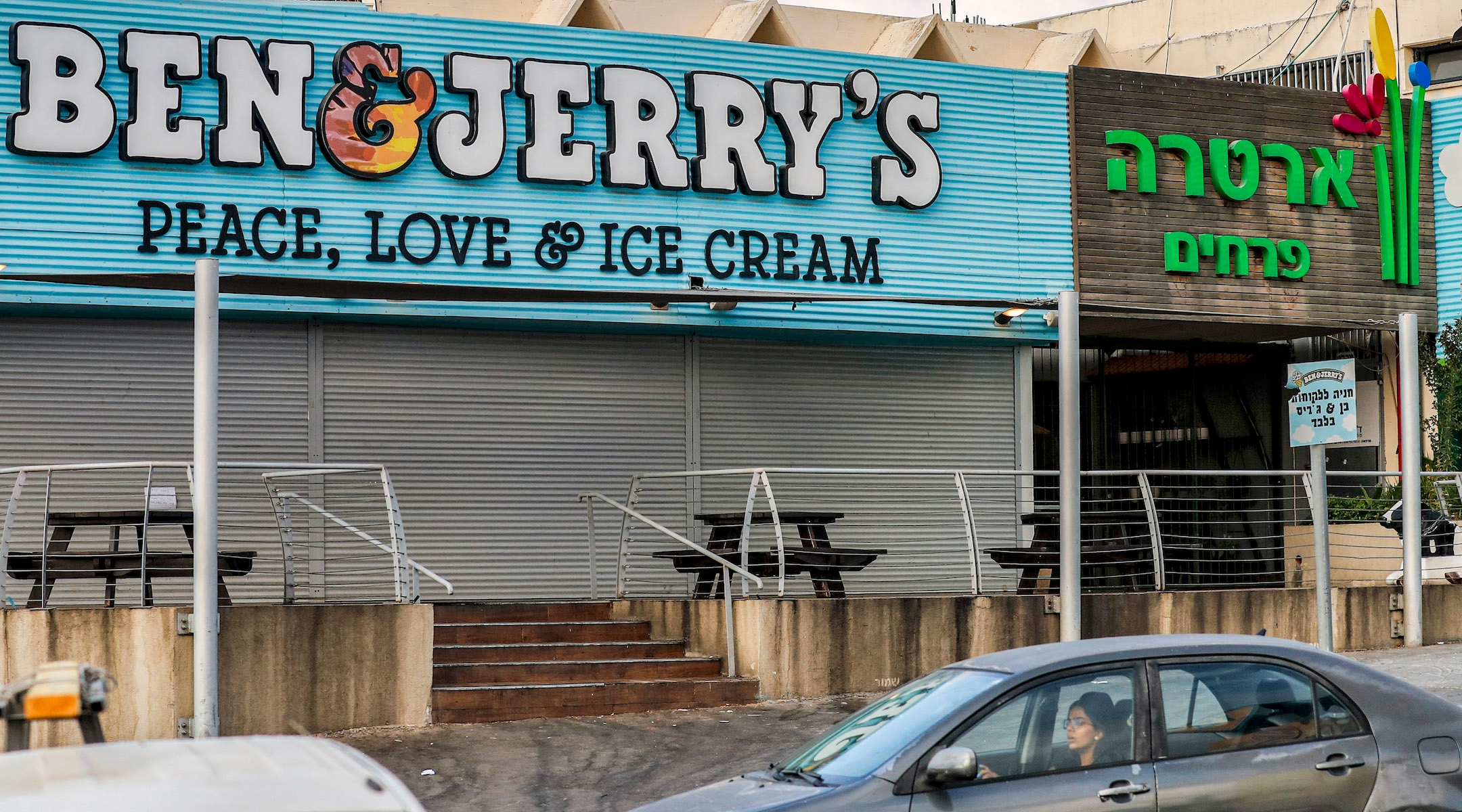A Ben & Jerry’s battle over Israel, long frozen, thaws anew amid Gaza war
In a new lawsuit, the ice cream brand accuses its parent company of censorship, threats and intimidation related to Ben & Jerry’s pro-Palestinian activism

Motorists drive past a closed Ben & Jerry’s ice-cream shop in the Israeli city of Yavne, south of Tel Aviv, July 23, 2021. (Ahmad Gharabli/AFP via Getty Images)
(JTA) — The years-long legal battle between Ben & Jerry’s and its parent company Unilever is back for a second helping.
The ice cream company, whose brand advocates for progressive causes, stirred controversy in 2021 by saying it would prevent its product from being sold in “Occupied Palestinian Territory.” This time it is accusing Unilever of censorship and intimidation over Ben & Jerry’s support for Palestinians, which has intensified during Israel’s war with Hamas in Gaza.
The new lawsuit, filed Wednesday, claims that Unilever attempted to dissolve Ben & Jerry’s independent board and tried to prevent the brand from taking a number of pro-Palestinian positions on the war, according to The New York Times.
In its acquisition deal with the ice cream maker in 2000, the British conglomerate received two of 11 seats on Ben & Jerry’s board but agreed to allow the company to retain control over its brand and image, according to the Times. In the lawsuit, Ben & Jerry’s says it hopes to “safeguard the company from Unilever’s repeated overreaches.”
The suit specifically alleges that Unliever worked to stop Ben & Jerry’s from calling for a ceasefire in Gaza — which its board did in January — as well as from advocating for Palestinian refugees, supporting college students who protested the war and backing calls to end U.S. military aid to Israel.
Ben & Jerry’s accused Unilever of threatening to dismantle the brand’s board and sue individual members if it proceeded with its plan to endorse a ceasefire. The suit alleged that Peter ter Kulve, the head of Unilever’s ice cream unit, and Jeff Eglash, Unilever’s head of litigation, “attempted to intimidate” board members. (Earlier this year Unilever had separately announced plans to spin off its ice cream unit, which also includes Magnum and Talenti, in 2025.)
The suit also claims that ter Kulve expressed concerns about the “continued perception of antisemitism” if the Ben & Jerry’s board continued to advocate for Palestinian refugees.
“Unilever has silenced each of these efforts,” Ben & Jerry’s said in the lawsuit. Unilever rejected those claims.
The lawsuit says Unilever stopped Ben & Jerry’s from directing part of the $5 million it received in a 2022 settlement to groups helping Palestinian refugees, including Jewish Voice for Peace, an anti-Zionist group.
The suit said Unilever specifically objected to JVP because it felt the group was overly critical of Israel and because Unilever sought to stay “neutral” on the conflict. In response, according to the Times, Ben & Jerry’s pointed to financial contributions Unilever had made to Israeli organizations that it said had ties to the Israeli military.
The bad blood between the ice cream maker and its parent company dates back to July 2021, following a previous conflict between Israel and Hamas in Gaza, when Ben & Jerry’s announced that it would stop selling products in “Occupied Palestinian Territory,” understood to mean the West Bank.
“We believe it is inconsistent with our values for Ben & Jerry’s ice cream to be sold in the Occupied Palestinian Territory,” the company said. “We also hear and recognize the concerns shared with us by our fans and trusted partners.”
The brand’s Jewish founders, Bennett Cohen and Jerry Greenfield, defended the deciosn in an op-ed in the The New York Times, but the move drew rebukes from Israeli politicians and some American Jewish groups. The announcement also set off an avalanche of legal and financial battles.
Several U.S. states divested from Unilever based on state laws combating boycotts of Israel. In March 2022, American Quality Products, Ltd., an Israeli company that had owned Ben & Jerry’s Israel factories and distributed the product in Israel since 1987, sued Unilever over the West Bank policy.
Three months later, Unilever acted to keep selling its ice cream in Israel and the West Bank by selling its Israeli business interest in Ben & Jerry’s to AQP.
Ben & Jerry’s quickly came out against the decision, and soon after sued Unilever to block the sale. The brand argued that the sale was made without its board’s consent and that stopping the sale was necessary to protect “the social integrity that the ice cream brand has spent decades building.”
In December 2022, Unilever and Ben & Jerry’s resolved the suit. The terms of the agreement were confidential, but Unilever said its sale of Ben & Jerry’s ice cream in Israel and the West Bank would continue.














